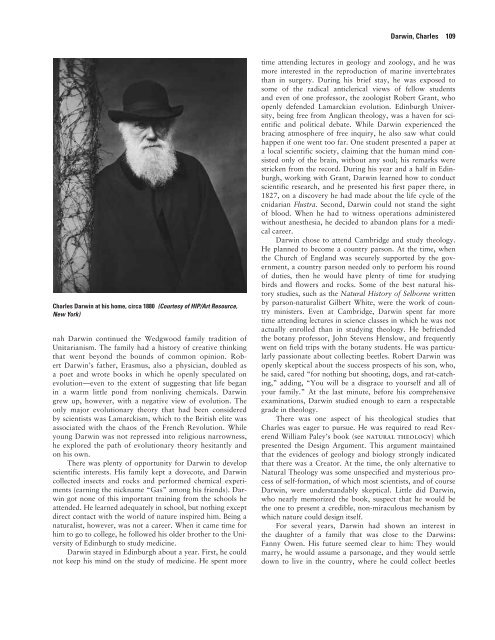Encyclopedia of Evolution.pdf - Online Reading Center
Encyclopedia of Evolution.pdf - Online Reading Center
Encyclopedia of Evolution.pdf - Online Reading Center
Create successful ePaper yourself
Turn your PDF publications into a flip-book with our unique Google optimized e-Paper software.
Charles Darwin at his home, circa 0 (Courtesy <strong>of</strong> HIP/Art Resource,<br />
New York)<br />
nah Darwin continued the Wedgwood family tradition <strong>of</strong><br />
Unitarianism. The family had a history <strong>of</strong> creative thinking<br />
that went beyond the bounds <strong>of</strong> common opinion. Robert<br />
Darwin’s father, Erasmus, also a physician, doubled as<br />
a poet and wrote books in which he openly speculated on<br />
evolution—even to the extent <strong>of</strong> suggesting that life began<br />
in a warm little pond from nonliving chemicals. Darwin<br />
grew up, however, with a negative view <strong>of</strong> evolution. The<br />
only major evolutionary theory that had been considered<br />
by scientists was Lamarckism, which to the British elite was<br />
associated with the chaos <strong>of</strong> the French Revolution. While<br />
young Darwin was not repressed into religious narrowness,<br />
he explored the path <strong>of</strong> evolutionary theory hesitantly and<br />
on his own.<br />
There was plenty <strong>of</strong> opportunity for Darwin to develop<br />
scientific interests. His family kept a dovecote, and Darwin<br />
collected insects and rocks and performed chemical experiments<br />
(earning the nickname “Gas” among his friends). Darwin<br />
got none <strong>of</strong> this important training from the schools he<br />
attended. He learned adequately in school, but nothing except<br />
direct contact with the world <strong>of</strong> nature inspired him. Being a<br />
naturalist, however, was not a career. When it came time for<br />
him to go to college, he followed his older brother to the University<br />
<strong>of</strong> Edinburgh to study medicine.<br />
Darwin stayed in Edinburgh about a year. First, he could<br />
not keep his mind on the study <strong>of</strong> medicine. He spent more<br />
Darwin, Charles 0<br />
time attending lectures in geology and zoology, and he was<br />
more interested in the reproduction <strong>of</strong> marine invertebrates<br />
than in surgery. During his brief stay, he was exposed to<br />
some <strong>of</strong> the radical anticlerical views <strong>of</strong> fellow students<br />
and even <strong>of</strong> one pr<strong>of</strong>essor, the zoologist Robert Grant, who<br />
openly defended Lamarckian evolution. Edinburgh University,<br />
being free from Anglican theology, was a haven for scientific<br />
and political debate. While Darwin experienced the<br />
bracing atmosphere <strong>of</strong> free inquiry, he also saw what could<br />
happen if one went too far. One student presented a paper at<br />
a local scientific society, claiming that the human mind consisted<br />
only <strong>of</strong> the brain, without any soul; his remarks were<br />
stricken from the record. During his year and a half in Edinburgh,<br />
working with Grant, Darwin learned how to conduct<br />
scientific research, and he presented his first paper there, in<br />
1827, on a discovery he had made about the life cycle <strong>of</strong> the<br />
cnidarian Flustra. Second, Darwin could not stand the sight<br />
<strong>of</strong> blood. When he had to witness operations administered<br />
without anesthesia, he decided to abandon plans for a medical<br />
career.<br />
Darwin chose to attend Cambridge and study theology.<br />
He planned to become a country parson. At the time, when<br />
the Church <strong>of</strong> England was securely supported by the government,<br />
a country parson needed only to perform his round<br />
<strong>of</strong> duties, then he would have plenty <strong>of</strong> time for studying<br />
birds and flowers and rocks. Some <strong>of</strong> the best natural history<br />
studies, such as the Natural History <strong>of</strong> Selborne written<br />
by parson-naturalist Gilbert White, were the work <strong>of</strong> country<br />
ministers. Even at Cambridge, Darwin spent far more<br />
time attending lectures in science classes in which he was not<br />
actually enrolled than in studying theology. He befriended<br />
the botany pr<strong>of</strong>essor, John Stevens Henslow, and frequently<br />
went on field trips with the botany students. He was particularly<br />
passionate about collecting beetles. Robert Darwin was<br />
openly skeptical about the success prospects <strong>of</strong> his son, who,<br />
he said, cared “for nothing but shooting, dogs, and rat-catching,”<br />
adding, “You will be a disgrace to yourself and all <strong>of</strong><br />
your family.” At the last minute, before his comprehensive<br />
examinations, Darwin studied enough to earn a respectable<br />
grade in theology.<br />
There was one aspect <strong>of</strong> his theological studies that<br />
Charles was eager to pursue. He was required to read Reverend<br />
William Paley’s book (see natural theology) which<br />
presented the Design Argument. This argument maintained<br />
that the evidences <strong>of</strong> geology and biology strongly indicated<br />
that there was a Creator. At the time, the only alternative to<br />
Natural Theology was some unspecified and mysterious process<br />
<strong>of</strong> self-formation, <strong>of</strong> which most scientists, and <strong>of</strong> course<br />
Darwin, were understandably skeptical. Little did Darwin,<br />
who nearly memorized the book, suspect that he would be<br />
the one to present a credible, non-miraculous mechanism by<br />
which nature could design itself.<br />
For several years, Darwin had shown an interest in<br />
the daughter <strong>of</strong> a family that was close to the Darwins:<br />
Fanny Owen. His future seemed clear to him: They would<br />
marry, he would assume a parsonage, and they would settle<br />
down to live in the country, where he could collect beetles


